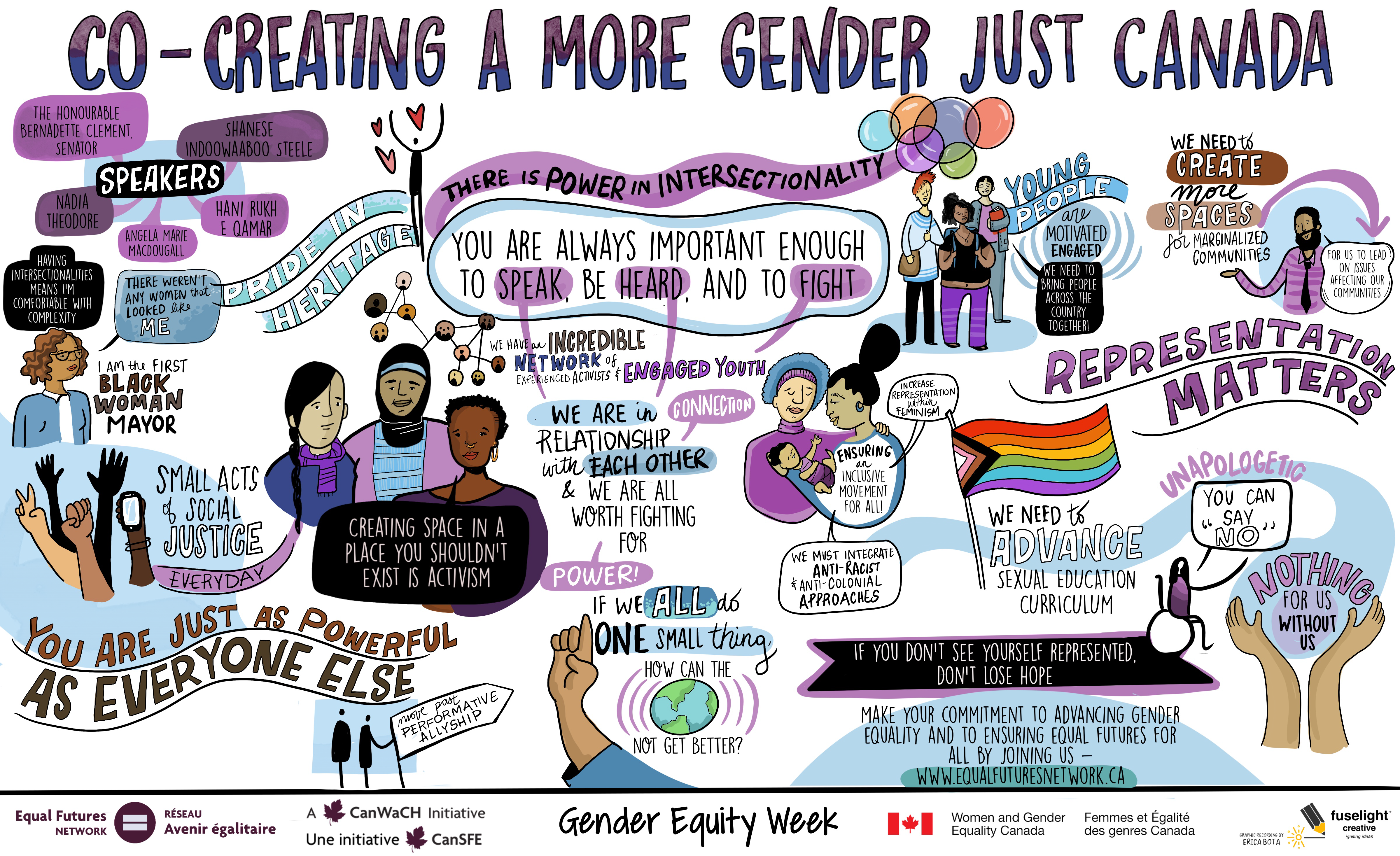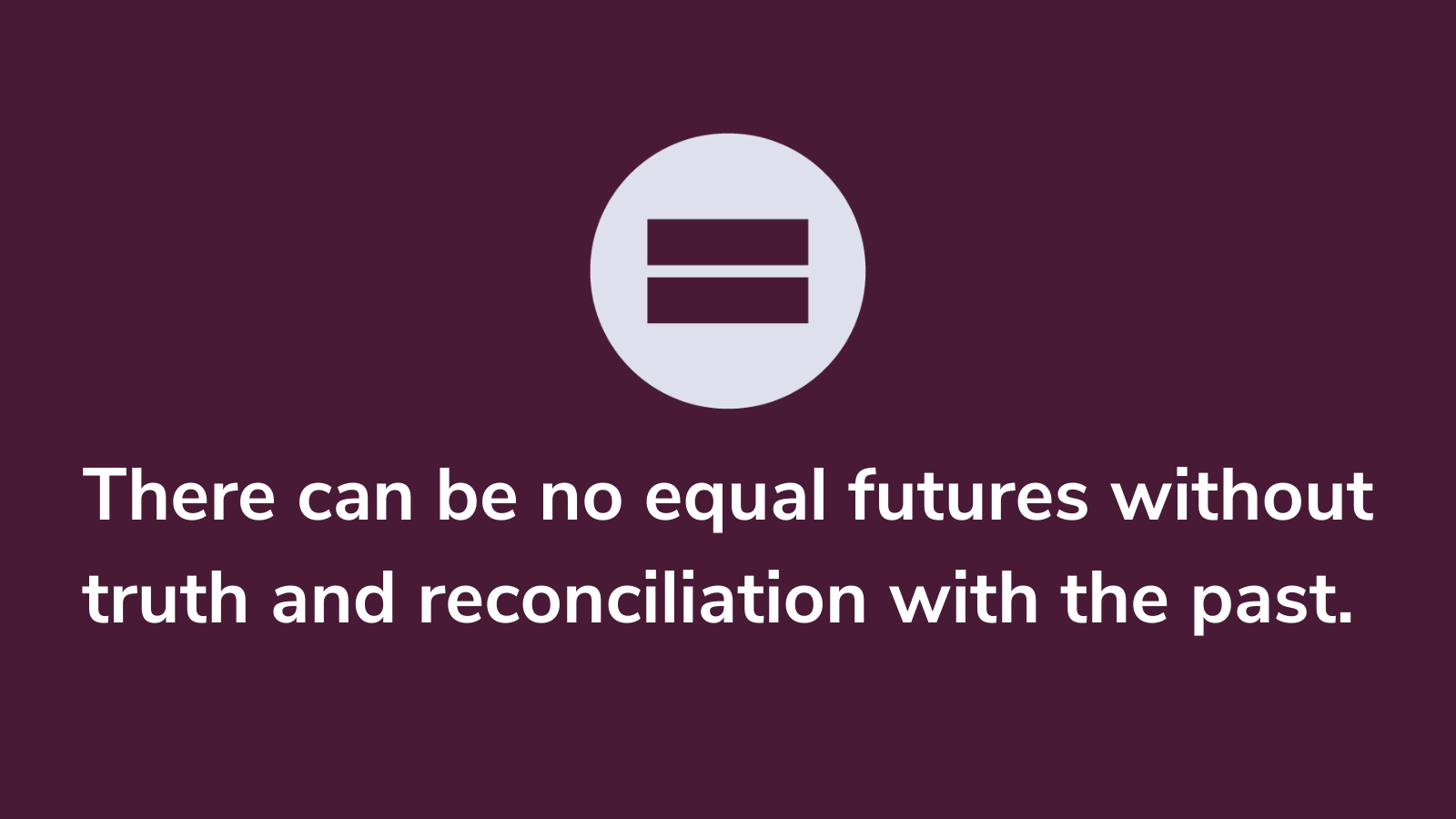
Gender Equality Week is an opportunity for people from coast to coast to coast to celebrate the progress we have made in advancing gender equality in Canada and around the world. It is also a time to reflect on the work that still needs to be done in order to make sure that everyone – regardless of their gender – can reach their full potential.
To mark Gender Equality Week 2021, the Equal Futures Network hosted a variety of programming and events throughout the month of September. Activities included programming from diverse partners and participants with expertise in: advocacy, education, policy development, research, programming and more. Featuring young leaders, key stakeholders, our membership, and sector partners, the events offered an opportunity to convene individuals, groups, and organizations advancing gender equality and social justice in communities across Canada.
Here is what we heard:
Youth Engagement
On September 17, 2021, the Equal Futures Network brought together young leaders from across Canada to discuss key challenges impacting meaningful youth engagement at the community, regional and national levels.
- Building relationships:
Organizations should engage youth perspectives early on in a project in order to build long-term, mutually beneficial, and reciprocal relationships. It is crucial that youth have a seat at the table from the beginning and that they are not tokenized. Wielding lived experiences, young leaders bring unique insights and valuable knowledge to the table!
- Breaking down systemic barriers:
Organizations and people in positions of authority need to be aware of the structural barriers that prevent youth from participating in programs. Leaders should listen to their needs and work with them in order to create broad spectrum systems-change.
- Funding:
The most significant challenge that young leaders face is highly competitive, limited funding opportunities. There is a need to diversify and increase funding available for youth and youth-led organizations. Mentorship on proposal writing, budget creation and investing in other soft skills will support the growth and prosperity of youth-led organizations.
Advancing Gender Equality
On September 23, 2021, the Equal Futures Network hosted our September incubator, “co-creating a more gender just Canada”. Participants shared stories and gathered input on challenges and opportunities when working to advance gender equality and social justice in communities from coast to coast to coast.
This collaborative session involved participants in the creation of a roadmap and for actions and activities to advance gender equality and social justice at all levels across the country over the next year.
- Intersectionality:
Representation matters. People in leadership positions need to be reflective of the diversity of our communities. This will help to strengthen the gender equality movement and ensure that racialized and marginalized identities are seen, heard and supported at all levels. For this to happen, spaces need to be created for marginalized groups to lead, especially on issues that directly affect their communities.
- Prioritizing reconciliation, decolonization and anti-racism:
There is a lack of integration of anti-racist and anti-colonial approaches within the gender equality movement. In order to ensure an inclusive movement, there is a need to prioritize moving past performative allyship to find diverse solutions to big systemic issues. This work is ongoing and needs to be a central pillar of all gender equality and social justice work.
- Strengthening networks:
Through the Equal Futures Network,there is an opportunity to make linkages at local, regional and national levels that break down regional and industry silos.
Strengthening Capacity and Collaboration
On September 28 and 29, 2021, the Equal Futures Network hosted a workshop on Intersectional Monitoring and Evaluation (IME) in partnership with SEASONOVA. In this workshop, participants learned practical ways to integrate intersectionality and GBA+ into project evaluation frameworks while gaining further understanding of intersectional feminist approaches to work. The workshop was developed in response to a survey which asked members of the Equal Futures Network to identify gaps and areas for capacity-building within their work
What Do We Do Now?
These activities were designed to spark ideas, provoke thoughtful debate and convene cross-sectoral partnerships so we can continue to push the needle forward for gender equality across the country and around the world.
In order to make substantive change, organizations must examine who has a seat at the decision-making table and while asking themselves who is missing. By strengthening the collective capacity of the gender equality movement by sharing resources, knowledge and educational tools. The root causes of gender inequities are the same whether you live in Canada or another region of the world. Progress toward gender equality should be celebrated, but there is still a lot of work to be done to ensure equal futures for all.
The Equal Futures Network acknowledges that Indigenous people are the traditional guardians of Turtle Island, on the land also known as Canada






